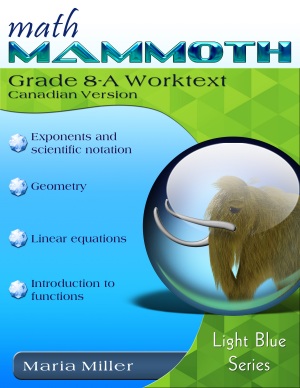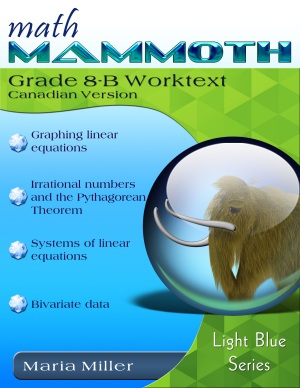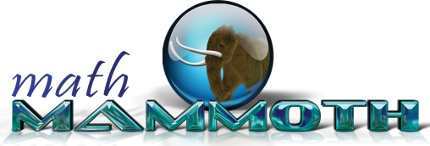Math Mammoth Grade 8, Canadian version
Math Mammoth Grade 8 is a complete math curriculum for 8th grade mathematics studies. Its topics are based on the Common Core Standards of the United States for 8th grade math, and thus, it contains some typical (U.S.) algebra 1 topics, but not all. You could classify it as an in-between course between traditional pre-algebra and algebra 1.

233 pages
214 lesson pages

214 pages
189 lesson pages
8-A contents and samples
8-B contents and samples
Scope and sequence
Worksheet generator preview
User Guide, grade 8
Light Blue Series FAQ
Prices & ordering
You can purchase Math Mammoth Grade 8, Canadian version, as a download, or as already printed books.
Digital version
Grade 8 complete:
USD $42.50 (download)
(the two worktexts, answer keys, tests, cumulative reviews, a worksheet maker)
Part 8-A only:
USD $21.25 (download)
(Everything for the first half of 8th grade math)
Part 8-B only:
USD $21.25 (download)
(Everything for the second half of 8th grade math)
You will be purchasing the download from my authorized reseller Comecero, LLC.
Printed copies
Printed copies at Lulu:
8-A worktext
8-B worktext
Tests & Cumulative Reviews
Answer Keys
Amazon & other bookstores: search with the ISBN numbers.
8-A worktext 9781954379015
8-B worktext 9781954379022
Tests & cumulative reviews 9781954379039
Answer keys 9781954379046
Supportive materials
This product is meant to go with the printed 8 student books, and includes digital versions of the answer keys, tests, cumulative reviews and the worksheet maker (USD $9.60).
Do NOT purchase if you get the printed answer keys and tests & cumulative reviews, or if you get the digital version.
At the heart of the curriculum are two student worktexts (A and B), each covering about half a year of math work. These worktexts contain all the instruction and the exercises in the same book — which makes lesson preparation a breeze. The worktexts are written directly to the student, and thus they allow many students to teach themselves and to learn directly from the books.
You will also get a separate answer key, chapter tests, additional cumulative reviews (I do recommend you use at least some of them), and a versatile worksheet maker (Internet access required) for those times when your student needs just a bit more practice.
This curriculum is essentially the same as the U.S. version of Math Mammoth Grade 8, only customized for the Canadian audience in these aspects:
- The curriculum uses the metric measurement units. Since Canadians do use some imperial units (inches, feet, miles), in some contexts, the curriculum does mention them, but not often. See an example of a question that mentions inches and here is another. (The questions work the same no matter what unit was used.)
- The spelling conforms mostly to American English, taking into account a few key differences where Canadian English follows British English.
- Numbers are formatted with a space as a thousands separator, and a point as a decimal separator.
- Page (paper) size is Letter.
The US version of the curriculum is aligned to the Common Core Standards, which means this curriculum may not be properly aligned to the eighth grade standards in your province. However, you can probably find material for any missing topics in neighbouring grades, which means you can simply re-order the material to solve most incompatibilities between different standards.
Features
- Math Mammoth focuses on conceptual understanding. It explains the "WHY", so students can understand the math, not just learn "HOW" to do it.
- The curriculum is mastery-oriented. This means it concentrates fairly long on a topic, delving into its various aspects. This promotes conceptual understanding, as opposed to spiral curricula that often tend to jump from topic to topic too much.
- It requires very little teacher preparation.

- The curriculum has no separate teacher's manual nor is it scripted. The introduction to each chapter has some notes for the teacher concerning the material in the chapter. All the instruction is written directly to the student in the worktext.
- There exist accompanying videos where you can see Maria herself teach the material.
- After each chapter introduction, you will find a list of Internet links and resources (games, quizzes, animations, etc.) that can be used for fun, illustrations, and further practice.
Additional feature for the digital version
The PDF files can be filled in on a computer, phone, or tablet, using the annotation tools found in many PDF apps. Learn more.
Overview of topics
Math Mammoth Grade 8 covers various traditional pre-algebra and algebra 1 topics, plus some geometry and statistics. The main areas of study are:
- exponent laws and scientific notation
- geometry: geometric transformations, angle relationships, and volume
- solving linear equations
- introduction to functions
- graphing linear equations and proportional relationships
- irrational numbers, square and cube roots, and the Pythagorean Theorem
- solving systems of linear equations (in two variables)
- statistics: scatter plots and two-way tables
Please also see the table of contents for 8-A and 8-B (in the sample files), which will let you see the topics covered in more detail.
Manipulatives / materials
Here is a list of materials and tools that are needed for grade 8 (geometry chapter).
- Patty paper/tracing paper (for 8-A).
- A ruler that measures in inches (for 8-A).
- A ruler that measures in centimeters/millimeters (for 8-A and 8-B).
- A compass (for 8-A).
- A protractor (for 8-A and one lesson in 8-B).
- Graphing paper (for 8-A and 8-B).
Introduction
In 8th grade, students spend the majority of the time with algebraic topics, such as linear equations, functions, and systems of equations. The other major topics are geometry and statistics.
We start with a study of exponent laws, using both numerical and algebraic expressions. The first chapter also covers scientific notation (both with large and small numbers), significant digits, and calculations with numbers given in scientific notations.
In chapter 2, students learn about geometric transformations (translations, reflections, rotations, dilations), common angle relationships, and volume of prisms, cylinders, spheres, and cones.
Next, in chapter 3, our focus is on linear equations. Students both review and learn more about solving linear equations, including equations whose solutions require the usage of the distributive property and equations where the variable is on both sides.
Chapter 4 presents an introduction to functions. Students construct functions to model linear relationships, learn to use the rate of change and initial value of the function, and they describe functions qualitatively based on their graphs.
In part 8-B, students graph linear equations, learn about irrational numbers and the Pythagorean Theorem, solve systems of linear equations, and investigate patterns of association in bivariate data (scatter plots).
Chapter 5 deals with the topic of graphing linear equations. Students study slope, and graph and write linear equations in slope-intercept and standard forms. They also learn about parallel and perpendicular lines.
In chapter 6, we delve into square roots, cube roots, irrational numbers, and equations involving square and cube roots. The rest of the chapter is spent studying the Pythagorean Theorem and its applications.
Next, in chapter 7, we focus on systems of linear equations. Students learn the three basic techniques for solving these and also solve a variety of problems that lead to a pair of linear equations.
The last chapter has to do with an introduction to bivariate data in statistics: scatter plots and two-way tables.
How and where to order
You can buy Math Mammoth books at:
- Here at MathMammoth.com website — simply use the "Add to cart" buttons you see on the product pages.
- Rainbow Resource carries printed copies for the Light Blue series books, plus several CDs (Light Blue and Blue series).
- Homeschool Buyers Club offers download versions of the Light Blue series, plus the Blue series bundle.
- Homeschool Planet sells the digital versions of the main curriculum and lesson plans to go with them.
- K5 Learning offers download versions of the Blue series.
- TPT sells the Light Blue Series downloads, plus topical units.
- Lulu sells printed copies for most of the Math Mammoth materials (various series).
By purchasing any of the books, permission IS granted for the teacher (or parent) to reproduce this material to be used with his/her students in a teaching situation; not for commercial resale. However, you are not permitted to share the material with another teacher.
In other words, you are permitted to make copies for the students/children you are teaching, but not for other teachers' usage.
Math Mammoth books are PDF files. I recommend you use Adobe Reader to view them, including if you use a Mac. You can try other PDF viewers, but they may at times either omit or mess up some of the images.
Receive my monthly collection of math tips & resources directly in your inbox — and get a FREE Math Mammoth book!
You can unsubscribe at any time.
Math Mammoth TourConfused about the different options? Take a virtual email tour around Math Mammoth! You'll receive: An initial email to download your GIFT of over 400 free worksheets and sample pages from my books. Six other "TOURSTOP" emails that explain the important things and commonly asked questions concerning Math Mammoth curriculum. (Find out the differences between all these different-colored series!)This way, you'll have time to digest the information over one or two weeks, plus an opportunity to ask me personally about the curriculum. A monthly collection of math teaching tips & Math Mammoth updates (unsubscribe any time) We respect your email privacy.
Note: You will FIRST get an email that asks you to confirm your email address. If you cannot find this confirmation email, please check your SPAM/JUNK folder. |
"Mini" Math Teaching CourseThis is a little "virtual" 2-week course, where you will receive emails on important topics on teaching math, including:
- How to help a student who is behind You will also receive: A GIFT of over 400 free worksheets and sample pages from my books right in the very beginning.We respect your email privacy.
Note: You will FIRST get an email that asks you to confirm your email address. If you cannot find this confirmation email, please check your SPAM/JUNK folder. |
Maria's Math TipsEnter your email to receive math teaching tips, resources, Math Mammoth news & sales, humor, and more! I tend to send out these tips about once monthly, near the beginning of the month, but occasionally you may hear from me twice per month (and sometimes less often). Peek at the previous tips here. You will also receive:
We respect your email privacy.
|
|
